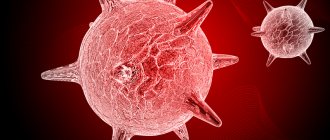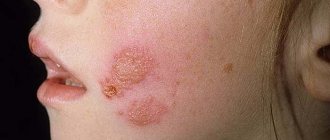Recurrent herpes of the external genitalia
Typical recurrent herpes on the skin and mucous membranes of the genital organs, usually in the same place, subjective: burning, itching manifested by repeated blistering rashes.
Atypical forms of recurrent herpes, which greatly complicate the diagnosis.
In atypical forms, either one of the stages of development of the inflammatory process in the lesion predominates (erythema, blistering), or one of the components of inflammation (edema, hemorrhage, necrosis), or subjective symptoms (itching), which give the corresponding name to the atypical form (erythematous, bullous, hemorrhagic, necrotic, itchy, etc.).
Atypical forms of herpes of the external genitalia are more common in women than in men.
The subclinical (asymptomatic) form is manifested by microsymptoms: short-term (less than a day) appearance of one or several microcracks, accompanied by slight itching. Sometimes there are no subjective sensations, which reduces the number of patients visiting medical institutions and complicates diagnosis.
The subclinical form is detected mainly during virological examination of sexual partners of patients with any sexually transmitted infection, or during examination of married couples with impaired fertility.
Clinical diagnosis of abortive course, atypical and subclinical forms of RGG is difficult and can only be made using virological research methods.
A feature of genital herpes is multifocality. The pathological process often involves the lower part of the urethra, the mucous membrane of the anus and rectum.
Organs of the genitourinary system in women and men that may be affected:
- entrance to the vagina;
- vagina;
- vaginal part of the cervix;
- cervical canal;
- urethra;
- bladder;
- anus;
- rectal ampulla;
- mucous membrane of the uterine cavity;
- body of the uterus;
- the fallopian tubes;
- ovaries;
- prostate;
- seminal vesicles;
Clinical forms
- Typical;
- Atypical;
- with macrosymptoms;
- with microsymptoms;
- Asymptomatic form;
It is very difficult to establish the real incidence of damage to the internal genital organs in both women and men, since in 25-40%, and according to some data, in 60% of patients, the disease occurs without subjective sensations. It can be assumed that this pathology occurs much more often than it is diagnosed.
With herpes of the internal genitalia there may be no complaints. Sometimes they note periodically appearing light mucous discharge from the urethra and vagina. During laboratory examination of smears of the cervical canal, vagina and urethra, an increased number of leukocytes is periodically noted (30-40 in the field of view of the urethral discharge, 200-250 or more in the field of view when examining smears from the vagina), indicating the presence of an inflammatory process.
The asymptomatic form of genital herpes of the internal genitalia (asymptomatic shedding of the virus) is characterized by the absence in patients of any complaints about the genital area, objective clinical data confirming inflammation. During a laboratory examination of the discharge of the urogenital tract, HSV is isolated, while in smears there are no signs of inflammation (leukocytosis). In 25-30% of men with idiopathic (when the cause of infertility is not clear) infertility, HSV is isolated from semen.
It is known that genital herpes, in 70-80% of cases, occurs in the form of a microbial association, in combination with chlamydia, urea-, mycoplasma, strepto-, staphylococci, fungal flora. It is possible that the genitals may be affected by HSV, gonococcus, treponema pallidum, and viral diseases transmitted through sexual contact, which indicates the need for a thorough examination of patients to exclude STIs and HIV infection.
Prices for services
Initial appointment with a urologist FOR MEN + ultrasound of the prostate gland (assessment of complaints, medical history, if necessary, rectal digital examination, ultrasound of the prostate gland in men)
Primary appointment – visiting a doctor of a specific specialty for the first time. Includes a conversation with the patient, an initial examination, anamnesis, if necessary, a digital rectal examination, and an ultrasound of the prostate gland. The price is valid from 02/01/2021 The price is not valid for appointments at the branches of Bolshevikov Ave. and Prosveshcheniya Ave. Make an appointment
700 ₽ 900 ₽
Initial appointment with manager Department of Urology Rylchikov I.V. + Ultrasound (includes a conversation with the patient, initial examination, medical history, if necessary, rectal digital examination, ultrasound of the prostate gland)
Primary appointment – visiting a doctor of a specific specialty for the first time. Make an appointment
1170 ₽ 1500 ₽
Repeated appointment with the urologist
Make an appointment
550 ₽ 700 ₽
Treatment of genital herpes
INITIAL CONSULTATION
from 2,400 rub.
A pronounced therapeutic effect in more than 90% of patients during treatment is achieved thanks to:
- Decades of experience in treating recurrent herpes;
- An integrated approach to therapy;
- Individual selection of antiviral treatment (drugs and regimens) and immunomodulators;
- Experience with anti-relapse therapy;
Herpes can and should be treated
The result of treatment largely depends on the experience and skill of the doctor, as well as on the patient’s patience and careful compliance with the doctor’s recommendations. The treatment methods we use can significantly reduce the duration of treatment without losing the quality and effectiveness of therapy.
IT IS POSSIBLE, because the existing arsenal of antiviral and immune drugs allows us to solve many problems that arise in people suffering from recurrent forms (genitals, face, buttocks, and other rarer localizations). The correct methodological approach to examination and therapy will allow:
- quickly stop acute manifestations of the disease;
- carry out effective immunocorrection;
- reduce the frequency and intensity of clinical manifestations of subsequent relapses;
- significantly increase the duration of inter-relapse periods and achieve many months of clinical remission;
NECESSARY, because timely treatment is the prevention of the development of possible complications of herpetic infection:
- pain syndrome that develops when the nervous system is involved in the infectious process;
- spread of infection, when almost all organ systems can be involved in the infectious process;
- pathologies of pregnancy, fetus and newborn;
Your guarantee is our positive 18-year experience of working with patients suffering from severe complicated forms. We know almost everything about modern medications (imported and domestic) and existing treatment methods. We identify and eliminate the causes that led to the development of the disease.
Our employees (dermatovenereologists, obstetricians-gynecologists, urologists-andrologists) are the authors of methodological recommendations, textbooks and courses of lectures, which are used by doctors in Russia; take part in international trials on herpes problems.
Diagnosis of genital herpes
Laboratory diagnostic methods are fundamentally divided into two groups:
- isolation and identification of the herpes virus (on cell culture) or identification of the herpes simplex virus antigen from infected material (in immunofluorescence reaction, polymerase chain reaction “PCR”, etc.);
- detection of herpes-specific antibodies (IgM, IgG) in blood serum.
When diagnosing herpes, you must remember that:
- To reduce the likelihood of a false-negative diagnosis, especially with genital herpes and asymptomatic forms of the virus, it is necessary to examine the maximum number of samples from one patient (vaginal discharge, cervical canal, urethra, prostate juice, semen, urine), because the herpes virus is rarely detected simultaneously in all environments.
- If a herpetic infection is suspected, it is necessary to conduct multiple virological studies of the discharge of the genitourinary system in patients, because a negative result of a single virological test cannot completely exclude the diagnosis.
- The frequency of virus isolation in women largely depends on the phase of the menstrual cycle. In more than 70% of patients suffering from herpes, the virus is released at the beginning of the menstrual cycle.
- Detection of specific immunoglobulins IgM in the absence of IgG or with a 4-fold increase in titers of specific IgG in paired blood sera obtained from a patient with an interval of 10-12 days indicates primary infection.
- The detection of specific immunoglobulins IgM against the background of IgG in the absence of a significant increase in IgG titers in paired sera indicates an exacerbation of chronic herpetic infection.
- Detection of IgG titers above average is an indication for additional examination of the patient and detection of herpes virus isolation in the media.
Which doctor should I contact if I have herpes in the intimate area?
A venereologist has the greatest knowledge and experience in treating genital herpetic infections. At the appointment, the doctor will determine the localization, stage of the viral process, and the condition of the regional lymph nodes. Material is taken from the surface of the rash and from the urethra for PCR analysis to determine the type of herpes and related sexually transmitted infections.
To clarify the diagnosis and develop a treatment plan, blood is taken to determine antibodies to various types of herpes viruses and the state of the immune system.
Epidemiology
Genital herpes, being a special case of herpetic infection, is one of the most common sexually transmitted diseases, and differs from other diseases of this group in the lifelong carriage of the pathogen in the human body, which determines the high percentage of formation of recurrent forms of the disease.
Transmission routes
Transmission usually occurs through close contact with a sick person or a virus carrier. The virus penetrates through the mucous membranes of the genital organs, urethra, rectum or microcracks in the skin.
In couples where one partner is infected, the probability of infection of the second partner within a year is 10%. In most cases, infection occurs when the infected partner has not had a clinically significant recurrence of genital herpes. Asymptomatic and unrecognized forms of infection play an important role in the spread of the virus. The virus can be excreted in sperm; cases of infection of women during artificial insemination have been described. Speaking about the routes of transmission of the virus, it is necessary to note the important epidemiological significance of oral-genital contacts, which are associated with an increase in the frequency of isolation of herpes type 1 from the genitourinary system.
Who gets sick more often?
Among college students, antibodies to the herpes virus type II are detected in 4% of those examined, among university students - in 9%, among representatives of the middle strata of society - in 25%; among patients in dermatovenerological clinics with heterosexual orientation – 26%; among homosexuals and lesbians – 46%, among prostitutes – 70–80%. Antibodies to genital herpes are more often detected in representatives of the Negroid race than in whites. Women are infected more often than men, with the same number of sexual partners during their lifetime. In developed countries, the virus affects 10–20% of the adult population.
Numerous studies on the general population have shown that the incidence rate increases with age: isolated cases are detected in a group of patients aged 0–14 years; the highest incidence is recorded in the age group 20–29 years; the second peak incidence occurs at 35–40 years of age.
The main risk factors for developing the virus are a large number of sexual partners throughout life, early onset of sexual activity, homosexuality in men, belonging to the black race, female gender and a history of sexually transmitted infections.
Mandatory registration of genital herpes was introduced in the Russian Federation in 1993. During the period 1993–99, the incidence of this virus in Russia increased from 8.5 cases to 16.3 per 100 thousand population. The incidence in Moscow increased from 11.0 to 74.8 cases per 100 thousand population and almost reached the level of European countries.
Clinical features of herpetic infection in women
Herpes of the urethra and bladder
Herpetic urethritis in women is subjectively manifested by pain and cramping at the beginning of urination, and a frequent urge to urinate. With herpetic cystitis, hematuria, pain at the end of urination, blood in the urine, and pain in the bladder area appear.
Herpetic cystitis
In a woman, the first and only sign of HSV infection may be in the genitourinary tract. It often occurs in the first 1-3 months after the start of sexual activity or a change of sexual partner.
Herpes of the anal area and rectum
The lesion in the anal area usually represents a recurrent fissure, which is often a reason for diagnostic errors. Such patients with an erroneous diagnosis of “anal fissure” end up with surgeons. The itchy form of herpes anus and herpetic lesions of hemorrhoids are also difficult to diagnose.
The list of diseases etiologically associated with HSV is constantly growing. According to the literature, in 3.6% of women suffering from treatment-resistant colpitis and cervical leukoplakia, HSV is one of the etiological factors of the disease. A new form of latent intrauterine HSV-II infection with localization of the pathological process in the glandular epithelium of the endometrium is described. It has been proven that HSV can cause the development of endometritis and salpingoophoritis.
The asymptomatic form of herpes of the internal genitalia is detected in 20-40% of women suffering from herpes of the buttocks and thighs. This important circumstance must be taken into account when planning pregnancy in women with this form of GC due to the existing likelihood of developing complications of HSV infection during pregnancy.
The etiopathogenetic role of HSV in cervical cancer has been established. The above emphasizes the growing etiological role of HSV in the structure of diseases of the pelvic organs in women.
Herpes and pregnancy
The prevalence of HSV among pregnant women in the United States is 22-36%, in Europe 14-19%. Viremia in women during pregnancy can cause fetal death, stillbirth, and premature birth. Herpes viruses cause up to 30% of spontaneous abortions in early pregnancy and over 50% of late miscarriages; they are second only to the rubella virus in terms of teratogenicity (the development of fetal deformities).
The most severe forms of neonatal herpes develop when a newborn is infected with the herpes simplex virus during childbirth. With primary herpes in the mother, from 30% to 80% of children are infected, with recurrent herpes – 3–5%. Infection of the fetus during delivery, if the mother had herpetic eruptions at the end of pregnancy, occurs in 50% of women with RGG; however, 60–80% of infected children develop encephalitis.
Genital herpes in men
If the study of herpes of the external genitalia and the adverse effect of herpetic infection on the reproductive function of women has received close attention for many years, then information about the herpes simplex virus as a cause of diseases of the genitourinary system (GUS) in men is very limited. It should be said that assessing the true role of the herpes simplex virus in the development of pathology of the MPS organs in men, taking into account the frequent low-symptomatic or asymptomatic course of the infection, often turns out to be a very difficult task.
Herpes urethra
Subjectively, urethral herpes is manifested by pain in the form of burning, a sensation of heat, hyperesthesia along the urethra at rest and during urination, and pain at the beginning of urination.
The organs of the MPS in men are in a close anatomical and physiological relationship, which does not allow a mechanistic approach to assessing the results of laboratory research. Thus, detection of the herpes simplex virus in urine or urethral discharge allows us to suspect the possibility of involvement of the prostate gland in the infectious process, even if the herpes simplex virus is not detected in the prostate juice, but there is clinical evidence of torpid prostatitis.
Bladder herpes
The leading symptoms of herpetic cystitis are the appearance of pain at the end of urination, dysuric phenomena; hematuria is its characteristic manifestation. Patients have a urinary disorder: the frequency, nature of the stream, and the amount of urine change. Herpetic cystitis in men, as a rule, is secondary and develops as a complication during exacerbation of chronic herpetic urethritis or prostatitis.
Herpes of the anal area and rectum
Herpetic lesions of the anal area and rectal ampulla occur in both heterosexual men and homosexuals. The lesion is usually a recurrent fissure.
When the sphincter and mucous membrane of the rectal ampulla are damaged (herpetic proctitis), patients are bothered by itching, burning sensation and pain in the affected area, small erosions occur in the form of superficial cracks with a fixed localization, bleeding during defecation. The appearance of rashes may be accompanied by sharp bursting pain in the sigmoid region, flatulence and tenesmus, which are symptoms of irritation of the pelvic nerve plexus.
Herpes prostate (herpetic prostatitis)
According to various authors, prostatitis is caused or supported by the herpes simplex virus in 2.9 - 21.8% of cases. Typically, chronic prostatitis is characterized by frequent and persistent recurrence.
In clinical practice, the diagnosis of chronic herpetic prostatitis is rarely made by urologists. The reason, apparently, is that virological diagnostic methods are not included in the standard examination of patients with chronic prostatitis. The doctor’s stereotype of thinking comes into play, and patients are traditionally screened for sexually transmitted infections of a non-viral nature.
In the clinical course of prostatitis, functional changes are noted - reproductive changes, pain (with irradiation to the external genitalia, perineum, lower back) and dysuric syndromes.
Often in patients with recurrent genital herpes
prostatitis occurs subclinically: in these patients, the diagnosis of prostatitis is made based on the appearance of leukocytosis in the prostate secretion and a decrease in the number of lecithin grains.
It must be remembered that herpetic prostatitis can exist as an isolated form of herpetic infection. In this case, there are no symptoms of RGG and HSV is not detected in the urethral discharge. The etiological diagnosis is based on the detection of the herpes simplex virus in the secretion of the prostate gland, while there is no pathogenic flora in the secretion and in the third portion of urine.
Therapeutic measures
The key to the problem of genital herpes is the correct approach to treating the disease and preventing its relapses. Regardless of the location of the rash and the frequency of exacerbations, comprehensive treatment is always necessary. The most common mistake is to limit therapy exclusively to local antiviral agents. Local therapy does not cure, but only eliminates skin manifestations of the infection. Since the herpes simplex virus lives inside the body, it needs to be affected from the inside, i.e. systematically.
The modern arsenal of antiherpetic drugs makes it possible to effectively combat not only the exacerbations of genital herpes themselves, but also the complications that can arise from it. Treatment of simple genital herpes is based on general approaches. First of all, therapy should be comprehensive, with the obligatory prescription of antiviral drugs. The basic therapy is combination antiviral therapy, a combination of acyclic nucleosides with interferon. This combination is required due to the fact that acyclic nucleosides (acyclovir, valacyclovir, famciclovir) disrupt the reproduction of the herpes simplex virus, and interferons destroy active forms of infection in the body.
A well-studied interferon for systemic use is the drug Viferon Suppositories. It is a complex of recombinant alpha-2b interferon and antioxidants (vitamins E and C). For faster relief of skin manifestations, Viferon Gel or Viferon Ointment can be prescribed. In case of psychosomatic complications, the patient is recommended to receive specialized help from a psychologist, neurologist and other specialists. Currently, there are individual counseling programs aimed at psychological rehabilitation of patients with herpes simplex.
Reference and information material
Author of the article
Khaldin Alexey Anatolievich
Dermatovenerologist, clinical immunologist, MD, professor
Loading...
Take other surveys










